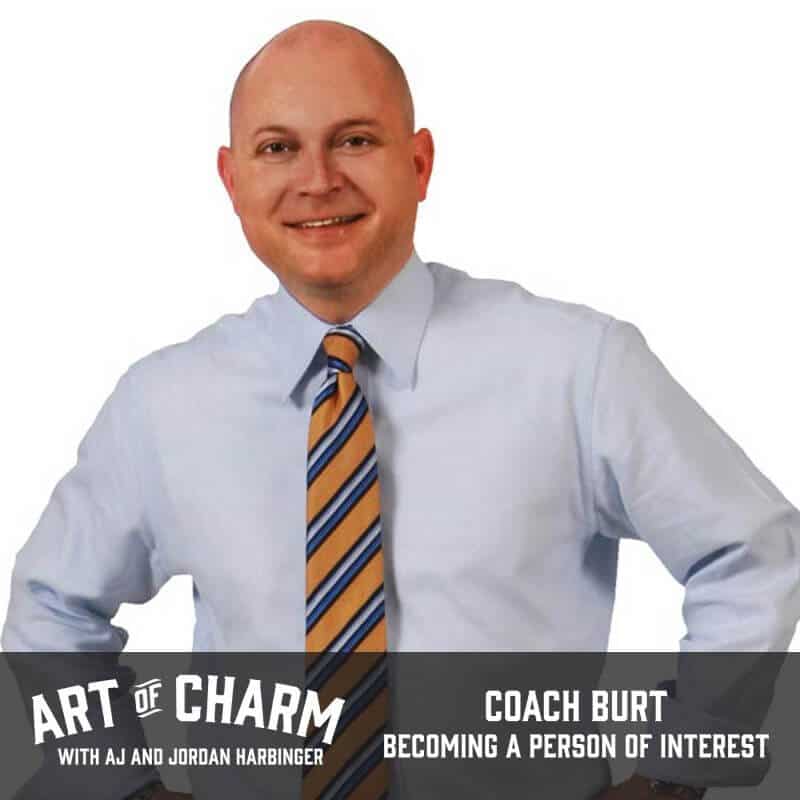Most of us are taught to chase opportunity, but a Person of Interest gets opportunity to chase them.
“‘Person of Interest’ is how you flip the script and become a buyer vs. a seller.” -Coach Burt
The Cheat Sheet:
- Why does everyone need a life coach?
- Do you have the ingredients to become a Person of Interest?
- Learn why you should never answer the question “What do you do?” (It’s a trap!)
- Would you rather find out if someone’s worth your time in 15 months, or 15 seconds?
- Underestimate yourself at the peril of becoming a commodity.
- And so much more…
[aoc-subscribe]
A lot of people commodify themselves out of good opportunities because they simply don’t know how to package and sell what they have that’s unique — which can often consist of talents, skills, or bodies of knowledge already acquired in the past. Taught not to look back, they miss the competitive advantage of history.
In episode 425 of The Art of Charm, we talk to super coach, author, and entrepreneur Micheal “Coach” Burt about the importance of differentiating from the herd, being honest enough to confront one’s own missing structures (aka problems), and what it means to be — and what it takes to become — a Person of Interest who attracts opportunities rather than having to chase them down.
More About This Show
Coach Micheal Burt describes himself as a Super Coach — he’s a former championship-winning coach with an entrepreneur’s mind. He started his own company in 2008 to coach and train entrepreneurs, sales professionals, and people looking for a competitive advantage — particularly in saturated markets.
A lot of people feel left behind in their chosen field because there are too many others doing what they’re doing, nobody’s noticing them, and they get passed up for promotions repeatedly. Chances are, if you were to ask these people what their talents are, their answers would be vague: “I’m a good person” or “I work hard” or “I show up on time.” But none of these differentiate them from anyone else, which is a problem Coach Burt addressed in his book Zebras and Cheetahs: Look Different and Stay Agile to Survive the Business Jungle.
By differentiating — that is, looking different from every other animal on the savannah — a zebra creates unique and proprietary value that keeps it alive. Your competitive advantage comes from your past — education, experiences, struggles — and that’s what you’re being paid for. These are unique and proprietary values forged in your past.
In his most recent book, Person of Interest — How You Become the Person Other People Want a Piece of and Cannot Live Without, Coach Burt takes the concept of differentiation to a whole new level. “To attract other people, we must become attractive,” he says. “To become attractive, you must first ask ‘how attractive are we today?’ Every 30 days, we do a Person of Interest Assessment.”
The Person of Interest Assessment
The Person of Interest Assessment is when we take a look at how these numbers have been performing for us:
- How many leads we’ve received for people interested in our product or services.
- How many “incoming calls” we’ve received for our expertise or point of view.
- How many strategies we’ve used to get our phone to ring.
- How many people we’ve “pitched” our services to.
- How many people have indicated interest in our services that have not committed.
This month may be better than last month, but, as Burt says, “if your phone is not ringing, your schedule is not booked, and you are not hitting your goals,” you’re not yet a Person of Interest.
Burt imposes the Person of Interest Assessment on people because they won’t do it themselves. It’s hard to look in the mirror, and this is why Burt believes everyone needs a coach in life. As the old adage goes, you can’t see the picture when you’re inside the frame.
Burt says that a good coach will do three things for you:
- Have conversations with you that you don’t want to have.
- Force you to do some things you don’t want to do.
- Help you become something you didn’t think you could become.
In this case, the goal is to become a Person of Interest as outlined in Burt’s book.
7/10 successful people over a certain age will tell you they read a book called How to Win Friends and Influence People by Dale Carnegie.
It taught people the importance of always being interested in the people around you — a valuable lesson that still resonates 60 years after its first publication. Burt considers Person of Interest the modern equivalent, but it flips the idea: be interesting. Be a fascinating person. Live a fascinating life — so other people are interested in you.
Make it so people seek you out because there’s something you have that takes their low thoughts of value and converts them to high value. Spending time with you is a pleasure — and you make them feel better about themselves. You inspire them to be better.
You don’t want to chase people — you want to attract people. People of Interest are always in the transformation business. They’re never transactional. To clarify:
- Transformation: I come to you one way, and I leave you another way.
- Transaction: I have a transaction with you, and I can actually discard you as soon as the transaction is over.
That is, a Person of Interest uses his or her powers for good, not evil.
7 Core Ingredients of People of Interest
To find out how to become attractive to others, we must determine what is attractive to others. Burt says there are seven core ingredients that People of Interest possess in abundance — and that people want to tap into:
- Knowledge
- Skill
- Desire
- Confidence
- Likability
- Connectivity
- Deep Networks
Burt throws in the bonus of a “free prize” — something additional that others gain by pursuing a relationship with you. It’s a fringe benefit of sorts — like the toy at the bottom of a Cracker Jack box. It can be tangible, intangible, or even a greater helping of one of the above ingredients.
The “What Do You Do?” Trap
Too many people fall into the identity of their jobs, which limits them to one set of options instead of fully utilizing and expanding upon their seven core ingredients. This is why the “what do you do?” question is a trap. It commodifies by its very nature. Burt referred to a show we did with Simon Sinek a while back that pointed out how so many of us are concerned with what we do rather than asking why we do it.
When people ask you what you do, Burt says, instead of telling them what you do, tell them what you believe. In this way, you can tell in the first 15 seconds if they believe the same things you do. If it’s a match, the possibility of partnership or relationship opens.
What kind of beliefs?
A realtor Burt coached will tell people: “I believe that the person in front of you is the most important person at that moment at that time in the world. And in a noisy and distracted world, I give people my total, undivided attention.”
Burt will say: “Well, let me tell you what I believe. I believe everyone needs a coach in life.”
Then he’ll ask: “Have you ever had a good coach?”
Listen to the entirety of episode 425 to learn Coach Burt’s Whole Person Theory, what to do when your core ingredients are lacking, and how to use the Opportunity Filter to avoid getting into negative relationships once you do become a Person of Interest!
THANKS, COACH BURT!
Resources from this episode:
More books by Coach Burt
The Art of Charm bootcamps
You’ll also like:
The Art of Charm Toolbox
Best of The Art of Charm Podcast
On your phone? Click here to write us a well-deserved iTunes review and help us outrank the riffraff!




